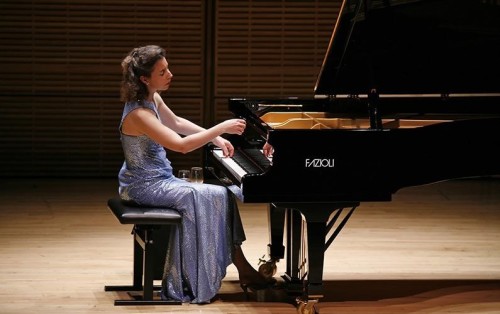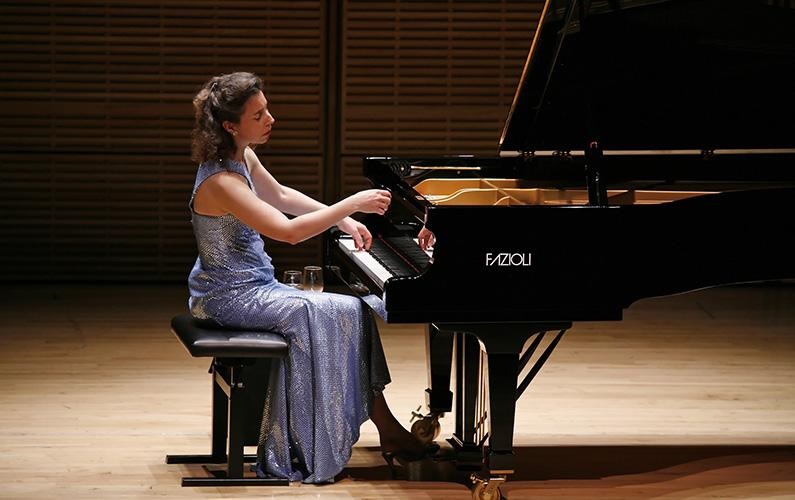 United Kingdom Bolero: Viva España – Ravel, de Falla, Debussy: Angela Hewitt (piano), BBC National Orchestra of Wales, Jun Märkl (conductor). St David’s Hall, Cardiff, 7.2.2019 (PCG)
United Kingdom Bolero: Viva España – Ravel, de Falla, Debussy: Angela Hewitt (piano), BBC National Orchestra of Wales, Jun Märkl (conductor). St David’s Hall, Cardiff, 7.2.2019 (PCG)

De Falla – Nights in the Gardens of Spain; The Three-cornered Hat: Suite No.1
Ravel – Piano Concerto for the Left Hand; Boléro
Claude Debussy – Images: Ibéria
I have long been an admirer of Jun Märkl’s interpretations of impressionist repertoire. I extolled the virtues of his Naxos set of Debussy’s orchestral music with the Orchestre National de Lyon in a 2012 review – please read the paragraph on an unconventional rendition of L’apres-midi d’une faune. Today again the conductor adopted a decidedly novel approach to much of the music, with results that many might regard as equally controversial.
Märkl’s interpretation of Ibéria from Debussy’s Images appears to have changed little over the past six years, with the castanets and other percussion well to the fore and the trombone glissandi in the final bars nicely placed in the mix if not as vulgar as they might be. But the results, with their clarified impressionist textures, were properly atmospheric in the nocturnal passages. Similarly, his delivery of the first suite from de Falla’s ballet The Three-cornered Hat lacked the last element of Spanish derring-do that this orchestra had achieved in their performance of the complete ballet under Pablo González back in December 2014; even so, Jaroslav Augustyniak’s characterful bassoon playing as before remained a delight, and the reading had plenty of high spirits.
In the first half of the programme, the two concertante works featuring Angela Hewitt formed an illuminating contrast, although the combination of two such challenging works in immediate succession must have proved quite an ordeal for the soloist. Ravel’s Concerto for the Left Hand was delivered with a sense of panache which quite belied the incredible difficulty of the solo part. The programme note by the late Gerald Larner drew attention to the fact that the composer made strenuous efforts to prevent pianists (including Alfred Cortot) playing the concerto with two hands, but the score nevertheless presents the solo line at many points on two staves as if half-anticipating that pianists might seek this solution. Needless to say, Angela Hewitt resisted the temptation, and differentiated the various registers of the piano superbly throughout.
The audience cheered Hewitt with enthusiasm but showed less excitement at her performance of de Falla’s Nights in the Gardens of Spain with its surprisingly downbeat and subdued ending. This, however, was to my ears the most revelatory performance of the evening. Hewitt resisted the common practice of treating the solo part as a concerto and allowed herself to be absorbed into the overall atmosphere that the composer was seeking to create. Märkl too was at his most imaginative here, allowing a sense of luminosity to shine through the clarified textures that he conjured up, even when his interpretation was at its most wayward. At one point, where de Falla marks the score ‘poco affrett’ (becoming faster) to be followed two bars later by the instructions ‘calando’ (calming) and ‘poco rit’ (a little slower), Märkl did exactly the opposite of what the composer asked. He successfully convinced at least this listener that his approach was more valid, or at least equally effective. The orchestral playing throughout was impeccable, and the performance was far more than the display showpiece that it can so easily become.
It might seem that the mechanical repetitions of Boléro would be proof against much variety of interpretation, but here once more Märkl’s approach was far from orthodox. Starting with an almost inaudible side drum ostinato, the theme was delivered at quite a fast pace. This quick tempo was maintained inexorably through to the very end in a manner which emphasised the minimalist quality of the music, and indeed made it sound in places unexpectedly modern. The result was very exciting, but I felt that a slightly more measured pace might have allowed the woodwind soloists in particular to bring out some variety of expression (although it is far from clear whether Ravel would have wanted this). The sudden and unexpected key change in the final bars lacked the sense of grinding catastrophe which it could have had at a marginally slower speed. Still, it was interesting to hear a different approach to a work which can so easily become stale with over-familiarity, and the undoubted excitement which Märkl generated brought extended cheering from the audience. Nonetheless, I am not sure that I would always want to hear Boléro done this way.
The performance is being broadcast in a relay on BBC Radio 3 on Monday 11 February; the whole programme was being repeated in the Brangwyn Hall in Swansea on 8 February, with a recording on Radio 3 at a later date. Both are of course also available on the BBC Sounds for thirty days thereafter, so home audiences will have plenty of opportunity to hear these readings again. They may find things here with which they disagree, but they will also find much food for thought and much that is revelatory. And it is precisely this sort of unpredictability, this willingness to take risks, that makes live music-making so enjoyable.
Paul Corfield Godfrey
For more about the BBC NOW click here.
